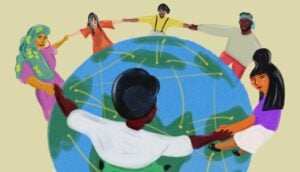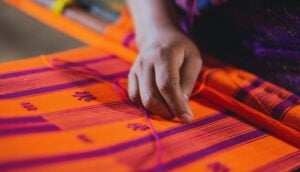Mars, like many companies, has long-standing commitments to support climate action (SDG 13) and gender equality (SDG 5). But we haven’t always looked at the intersections between these two areas. As we progress our Net Zero Commitment and our Cocoa for Generations plan, it is becoming clear that the two issues are inextricably linked. Women are central to climate mitigation and resilience – and they’re disproportionally impacted by the risks of climate change. Climate action isn’t just about protecting the planet – it’s about empowering people!
As companies around the world step up to reduce emissions and drive more regenerative practices, we’ll go farther, faster, if our strategies put women at the center.
Take for example the cocoa supply chain. In West Africa, climate change is expected to impact millions of smallholder farmers in the cocoa sector. It will bring longer and hotter dry seasons, more sporadic rains and an increase in pests and diseases. All of this means that land suitable for cocoa production will decrease in the future. It also likely means that it will get even harder for cocoa farmers to earn decent wages and look after health, nutrition, education, and everything else that is necessary for thriving households and communities.
Amidst these challenges, the imperative to proactively engage women in shaping climate action is becoming clearer. We have an opportunity to re-evaluate today’s agricultural practices and do things differently.
Here are three reasons why.
Women are already doing a lot of farm work, but they aren’t recognized for it and that is risky.
According to the Food & Agriculture Organization (FAO), women provide nearly 45% of the global agricultural labor force, but too often they work without pay, without land rights, without access to finance and networks.
These existing vulnerabilities mean that women in the agricultural sector tend to suffer disproportionately from the impacts of climate change. For example, the UN estimates that women are 80% more likely than men to be displaced by climate change.
Given the additional stressors that climate change is placing on agriculture and the valuable role that women play in global agricultural supply chains, addressing the underlying issues that keep women vulnerable will simultaneously reduce risks and safeguard the resilience of the agricultural sector.
Empowered women improve farming and farm communities.
Greater gender equity can lead to better outcomes for people and the planet we share.
Research shows that empowering women as leaders and decision-makers in farming communities can make positive impacts for those communities, while also advancing more climate-resilient agriculture. Women are powerful community organizers, and that drives impact at both the farm-level and the community level. According to the FAO, when women are provided the same resources as men, women can increase their agricultural yields by 20 – 30%. And women have a drive to pay it forward – they speak up more for the interests of communities because of their close involvement in community life.
The future of farming will become ‘feminized’.
We are seeing a ‘feminization’ of agriculture as increasing numbers of men are leaving farming to migrate to urban centers in search of better-paid work. With an increasing number of female-headed smallholder households, it’s critical that women smallholder farmers are connected to networks, inputs, and markets so they can be successful.
What Mars is doing
I firmly believe that preparing for, adapting to, and recovering from climate-specific risks in agriculture will be more effective if we listen to women. Our cocoa Resilience Journey began with human-centered research to understand the key barriers that women and girls face across sourcing communities.
By listening to women, girls, and community leaders across cocoa sourcing regions, we consistently heard about four key barriers they face:
- Girlhood ends too early through marriage and motherhood,
- Women do not have financial agency and control over decision-making,
- Gender-bias is entrenched in social norms that encourage men to earn and control money and women to carry out unpaid work,
- And, men dominate the first mile of cocoa, excluding women from income generating opportunities.
This focus on listening has shed light on systemic barriers that prevent women from reaching their full potential. Efforts to increase climate resilience must address these deeply entrenched barriers so that more women can lead as powerful agents of climate resilience in farming communities.
Now we are working to integrate these learnings into our Cocoa for Generations strategy, which aims to improve community development outcomes while mitigating negative environmental impacts across our sourcing footprint.
Integrated action to build climate resilience and women’s empowerment together is relatively new territory for Mars, and perhaps for others too. Companies must recognize the valuable role women farmers play in our business and supply chains and seek to understand more about the challenges that they face. Only then can we design gender-responsive climate action that dismantles the barriers that hold women back, while building more resilient agriculture supply.
It will require us to break down the silos which often separate work on environmental and social issues and recognize climate change is more than an environmental risk, it is a human rights risk too. As with any systemic challenge, we can make the greatest change through collaborative action, and through sharing the lessons learned along the way. But all the evidence suggests integrated action will be more than worth it – for supply chains, for the planet we share, and for women.










